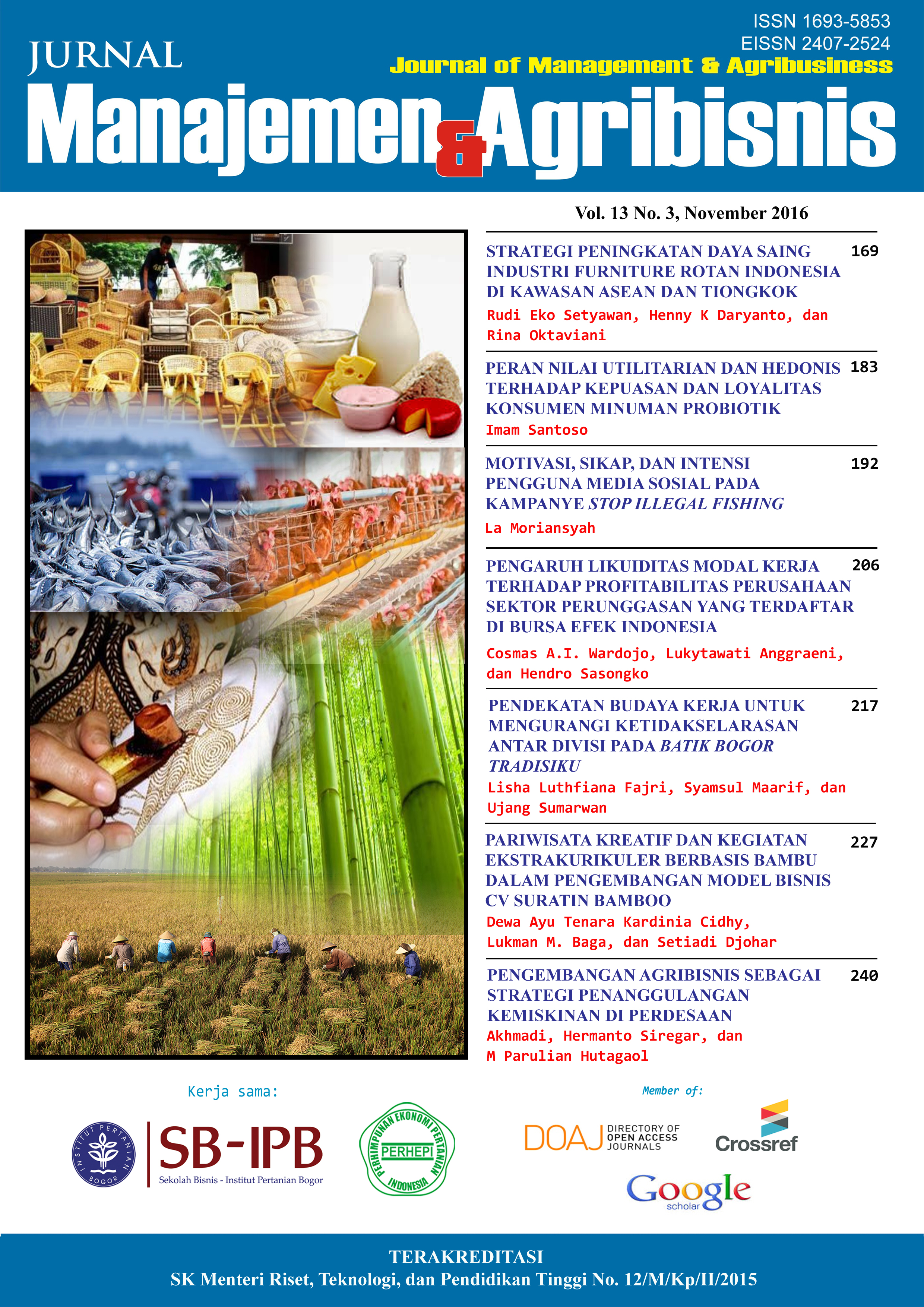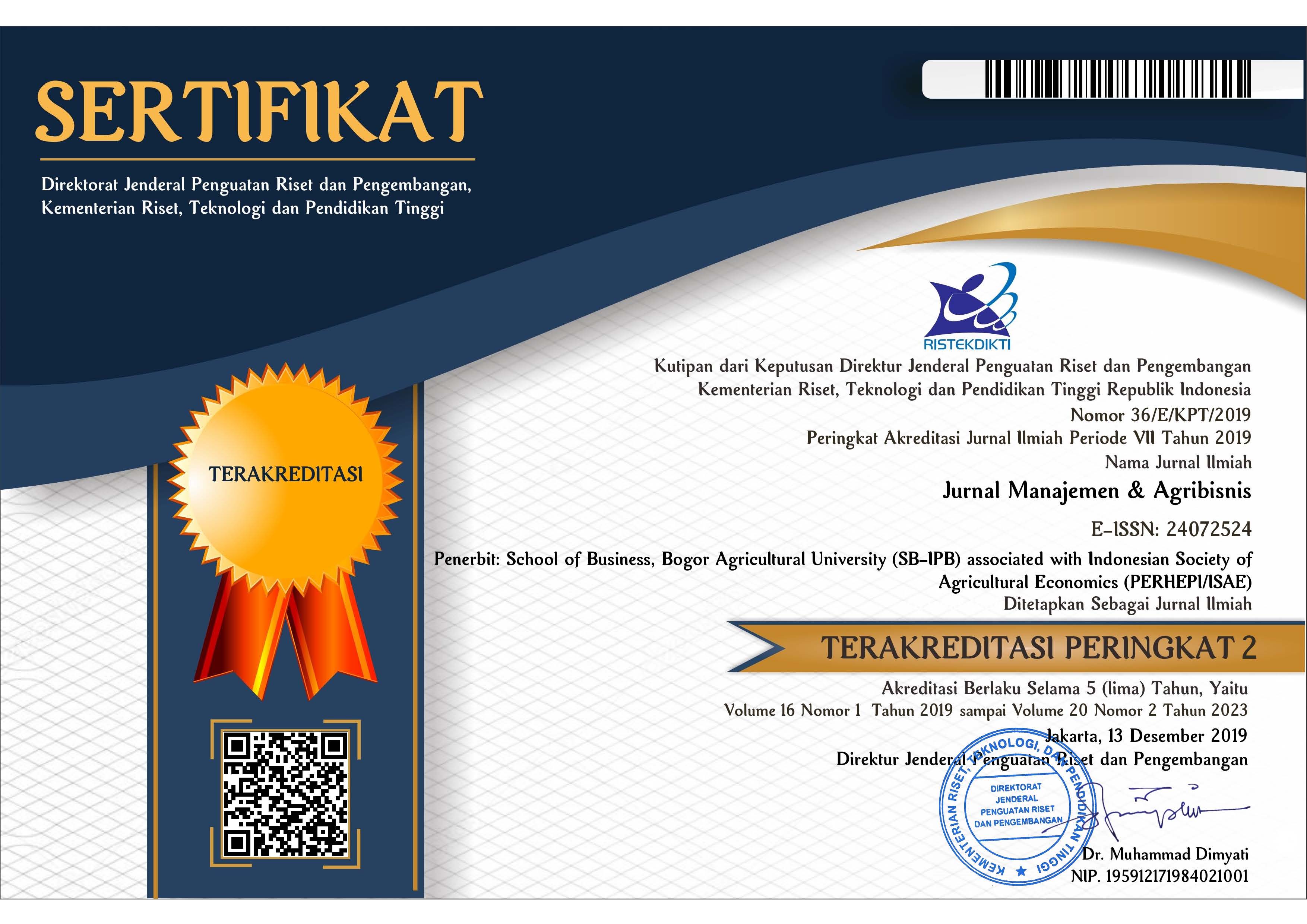PERAN NILAI UTILITARIAN DAN HEDONIS TERHADAP KEPUASAN DAN LOYALITAS KONSUMEN MINUMAN PROBIOTIK
DOI:
https://doi.org/10.17358/jma.13.3.183Abstract
The rising standard of living and welfare of the community influences the food consuming pattern. This is signified by an increase in demand for probiotics as a functional beverage. This study aims to analyze the role of utilitarian and hedonic attitudes towards customer satisfaction and loyalty. Non-probability and purposive sampling were utilized as the sampling techniques of this study. There were 100 respondents in total participated in the study. The criteria of respondents were ages of 18 and older and consumers of brand X of probiotics beverage for at least twice a month. The data were processed by using the Partial Least Square (PLS). The results showed that the utilitarian value has a significant effect on satisfaction and customer loyalty, while the hedonic one affects customer satisfaction and loyalty. The results of this research also showed that satisfaction has an influence on customer loyalty.Keywords: hedonic, satisfaction, loyalty, probiotics, utilitarian, PLS
ABSTRAK
Meningkatnya taraf hidup dan kesejahteraan masyarakat berpengaruh terhadap pola konsumen pangan. Hal ini ditandai dengan meningkatnya permintaan minuman probiotik sebagai minuman fungsional. Penelitian ini bertujuan menganalisis peran utilitarian dan sikap hedonis terhadap kepuasan dan loyalitas konsumen. Metode pengambilan sampel dalam penelitian ini adalah non probability sampling dengan teknik purposive sampling. Jumlah responden sebanyak 100 orang. Kriteria responden adalah penduduk dengan usia 18 tahun ke atas dan mengkonsumsi minuman probiotik merk X minimal dua kali dalam sebulan. Data diolah menggunakan Partial Least Square (PLS). Hasil penelitian menunjukkan utilitarian berpengaruh signifikan terhadap kepuasan maupun terhadap loyalitas konsumen. Nilai hedonis berpengaruh terhadap kepuasan konsumen dan juga berpengaruh terhadap loyalitas. Hasil riset ini juga menunjukkan bahwa kepuasan berpengaruh terhadap loyalitas konsumen.
Kata kunci: hedonis, kepuasan, loyalitas, probiotik, utilitarian, PLS
Downloads
Download data is not yet available.
Downloads
Published
2016-11-02
Issue
Section
Articles
License
Authors who publish with this journal agree to the following terms:
- Authors retain copyright and grant the journal right of first publication with the work simultaneously licensed under a Creative Commons Attribution License that allows others to share the work with an acknowledgement of the work's authorship and initial publication in this journal.
- Authors are able to enter into separate, additional contractual arrangements for the non-exclusive distribution of the journal's published version of the work (e.g., post it to an institutional repository or publish it in a book), with an acknowledgement of its initial publication in this journal.
- Authors are permitted and encouraged to post their work online (e.g., in institutional repositories or on their website) prior to and during the submission process, as it can lead to productive exchanges, as well as earlier and greater citation of published work (See The Effect of Open Access).
How to Cite
Santoso, I. (2016). PERAN NILAI UTILITARIAN DAN HEDONIS TERHADAP KEPUASAN DAN LOYALITAS KONSUMEN MINUMAN PROBIOTIK. Jurnal Manajemen Dan Agribisnis, 13(3), 183. https://doi.org/10.17358/jma.13.3.183


.png)



